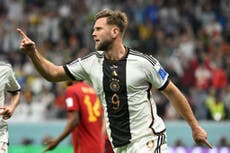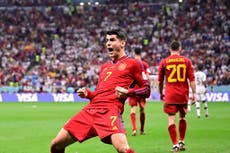Hansi Flick reverses roles after Japan loss as substitutes save Germany against Spain
Spain 1-1 Germany: Niclas Fullkrug lashed home an equaliser to end a move involving Leroy Sane, a fellow second-half substitute
If substitutes were Germany’s nemeses against Japan, a replacement turned their rescuer against Spain. Hansi Flick was outwitted as Hajime Moriyasu’s changes conjured a famous win for the Japanese. Flick could at least savour the sense of a role reversal when Niclas Fullkrug lashed a shot past Unai Simon after a move that involved another whom Flick had introduced, in Leroy Sane. Germany, who had conceded in the 83rd minute to Japan, scored in it against Spain.
Given the gulf in class at times, they may not have deserved a draw. Yet for decades, Germany were the specialists in prevailing, whether emphatically or efficiently, on penalties or within regulation time. They pilfered a point.
Now a team accustomed to finals in the truest sense of the phrase face another. There is a finality to their game against Costa Rica. There can be a gratitude towards their opponents, too. Given Spain’s superior goal difference, a draw at the Al-Bayt Stadium would have all but eliminated Germany if, as expected, Japan beat a side coming off a 7-0 walloping. Yet if the most important goal of Germany’s World Cup has been scored in previous years by Helmut Rahn, Gerd Muller, Andreas Brehme or Mario Gotze. in 2022 it has come courtesy not of Fullkrug, but of Keysher Fuller. If the name scarcely sounds Germanic, he is from Costa Rica, not Cologne and plies his trade for Herediano, not Hannover.
He changed the complex of the group long before Fullkrug changed this game. The 29-year-old is the oldest outfield player to debut for Germany for two decades and was scoring goals in the German second flight last season. Perhaps more pertinently, he is a specialist striker, the sort of purposeful, powerful forward that used to come off the production lines in the Bundesliga long before the Spanish made false nines fashionable. Fullkrug struck a blow for the old-fashioned No 9.
Were Timo Werner fit, the Werder Bremen man might not have been on the pitch. As it was, he came on for one of the leading scorers in World Cup history, in Thomas Muller, but one who is less suited to leading the line and whose last goal on the global stage came in 2014. Luis Enrique’s gamble in fielding an extra midfielder at centre back, in Rodri, was that he would not have much defending to do; until the last 20 minutes, he was right.
And yet the spark stemmed from Germany’s youngest player. Jamal Musiala is shaping up as the teenaged talisman. His was almost a one-man effort to save his side: teeing up Sane for one chance, drilling a shot at Simon, inadvertently setting up Fullkrug for the equaliser. Only Joshua Kimmich rivals him for the title of Germany’s player of the tournament so far and Kimmich had been their best hope of a goal before the break.
Elsewhere, issues have abounded. Germany have had problems in the right-back position in both games. Niklas Sule was that right back against Japan. Thilo Kehrer took over against Spain, didn’t get close enough to Jordi Alba when he crossed, and Sule was left sliding on his backside as Alvaro Morata put Spain ahead with a deft finish.
Ilkay Gundogan had claimed that some of Germany’s players did not want the ball against Japan. They could not get it against Spain. They spent their time chasing the shadows of Luis Enrique’s interchangeable identikit passers, who subsumed their identity for a collective cohesion. Pedri and Gavi might be one person, or two, or three, or four. No one really knows. Gundogan, Kimmich and Leon Goretzka are three outstanding midfielders, rather than a terrific midfield trio. They found themselves outmanoeuvred. Spain had two-thirds of possession. They eased in and out of space whereas the closest thing to a Spanish-style passer in the German camp, Gundogan, was miscast as a No 10.
Flick is looking for a formula. He has found one before against Spanish opponents. Barcelona’s historic humiliation came against Flick’s Bayern, an 8-2 scoreline that will reverberate through the ages. The group stage’s superpower summit featured two of the last three World Cup winners and had the feel of a Champions League tie transplanted onto the international stage. Six Bayern players started, as did five from Barcelona. Yet whereas the serial German champions invariably defeat the Catalans at club level, Spain registered a 6-0 Nations League win two years ago. Once again, Germany looked less than the sum of their parts.
Yet after starters struggled, an injection of Sane’s speed and Fullkrug’s bulk brought Germany respite. Perhaps there were echoes of 2018, when Toni Kroos’ late winner against Sweden in their second game offered the prospect of qualification, only for hopes to be dashed. Yet, on the day when Germany could have gone out, at least they still have hope after the substitutes changed the mood.
Join our commenting forum
Join thought-provoking conversations, follow other Independent readers and see their replies
Comments


Bookmark popover
Removed from bookmarks